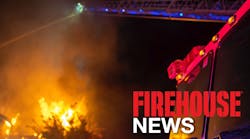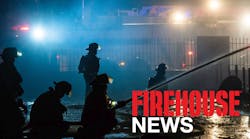A Massachusetts law enacted in 1987 prohibits any person who smokes any tobacco product from being appointed as a firefighter or police officer. It also requires the dismissal of any firefighter who smokes during the tenure of his or her employment, whether on or off the job. The firefighter has appealed the firing, but the Massachusetts Supreme Court upheld the law in 1997, in a similar case involving a police officer. It concluded that the Massachusetts Legislature intended to impose a strict prohibition against all smoking by firefighters and police officers. In the 1997 case, a woman was fired from her position as a police officer with the town of Plymouth because she smoked. She appealed to the Massachusetts Civil Service Commission, which held that she should be restored to her position because she had demonstrated that she no longer used tobacco products. However, the court upheld the town's action in firing the police officer.
The police officer never disputed that she had smoked. But, the Civil Service Commission determined that the law did not require mandatory termination in all cases. It based its decision on its interpretation of a Massachusetts law that prohibits alcohol abuse by civil service employees. The alcohol provision states, "no person habitually using intoxicating liquors to excess shall be appointed to or employed or retained in any civil service position." The commission concluded that it was unreasonable to allow an employee with a serious alcohol problem to remain in office (following rehabilitation), while requiring mandatory termination of an employee for smoking cigarettes.
The Massachusetts Supreme Court overturned the commission's decision. It noted that, "the plain wording of the statute expresses a mandatory directive requiring that 'no person . . . appointed after [January 1, 1988] shall continue in [the] office [of police officer or firefighter] if such person thereafter smokes any tobacco products.' " The court said that the commission's decision directly conflicted with the law.
The commission concluded that the alcohol prohibition never had been interpreted as requiring mandatory termination. Further, it decided that the same flexibility should be applied in disciplining firefighters and police officers who violated the smoking prohibition. The commission also thought that the legislature could not have intended greater flexibility in disciplining employees with serious alcohol problems than those who smoke cigarettes.
However, the court held that there are important differences between the purposes of two restrictions. The alcohol rule was enacted because serious alcohol abuse has a negative effect on job performance. But, the smoking prohibition was enacted to prevent firefighters and police officers from aggravating their risk of hypertension and heart disease by smoking. Indeed, the commission itself had determined that public safety officers are particularly susceptible because of the nature of their jobs.
The smoking restriction appears to have been enacted, at least in part, on the basis of the state's financial interest in reducing the potential liability for disability retirement benefits. The Massachusetts Legislature enacted the smoking ban in an effort to reduce the number of police officers and firefighters who obtain substantial disability benefits. As the court noted, the smoking law was enacted so that, over time, "police and fire departments will have a workforce free of a serious disease-causing addition."
Other departments around the country have adopted similar smoking bans. For example, the court cited an Oklahoma court decision upholding the constitutionality of a similar ban in Oklahoma City. That decision held that a smoking ban is not an unconstitutional infringement on liberty and privacy rights, because of the connection between the prohibition and the promotion of public safety. Likewise, career firefighters hired in Montgomery County, MD, after July 1, 1999, may not use any tobacco product. That rule was adopted as a part of an employee wellness initiative, in conjunction with the local firefighter's union.
Is it reasonable for states, or local fire departments and rescue squads, to prohibit employees from smoking, even when they are not on duty? Some would say no, arguing that such a ban is an unreasonable intrusion into the private lives of firefighters. The Massachusetts court concluded that the answer is yes, it is reasonable, because smoking at any time has a financial impact in the form of increased risk of disability retirement payments.
Yes, a smoking ban such as the Massachusetts law does intrude into the private lives of firefighters. However, every person who signs a contract of employment with a fire department agrees to accept a variety of intrusions into his or her personal life. As the Montgomery County agreement illustrates, a smoking restriction is part of the larger move on the part of employers to promote employee wellness. This is done both for the physical benefit of the firefighter, and the financial benefit of the department (and its parent government). It is, as the Massachusetts court concluded, a reasonable requirement to impose on newly hired firefighters.
Steve Blackistone, a Firehouse® contributing editor, is an attorney and a member of the Bethesda-Chevy Chase Rescue Squad in Montgomery County, MD.




